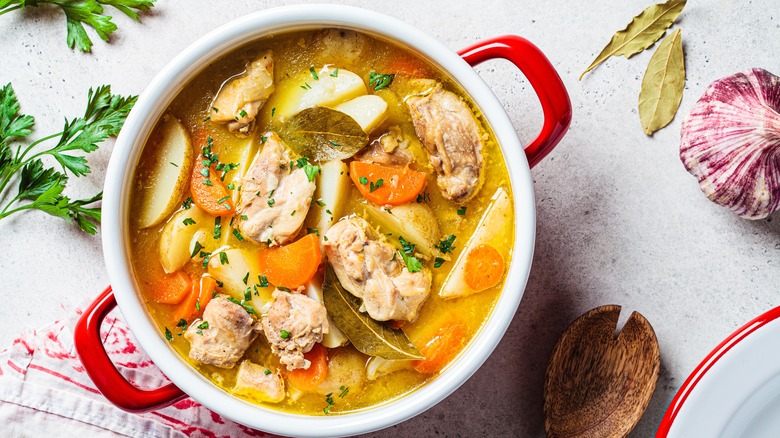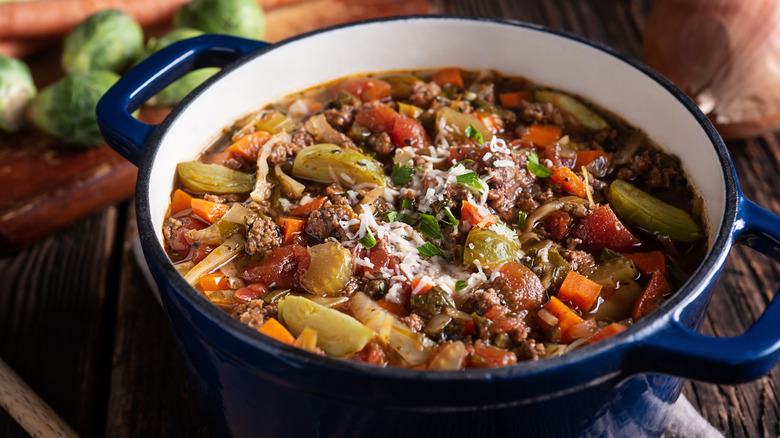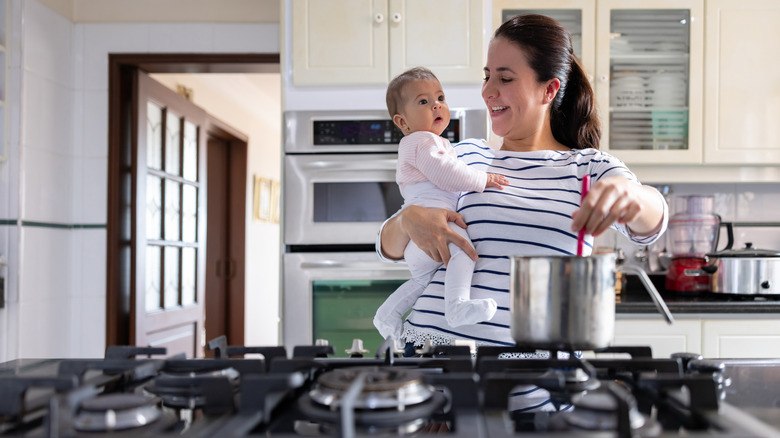The Best Soup Doesn't Always Start With The Ingredients Alone
When whipping up some tasty lemon chicken orzo soup, even the best ingredients can fall flat if you're not using the right type of cookware. That's why every soup-appreciating home chef should have a trusty stock pot in their cooking arsenal. It has some key features that make it ideal when preparing soup, such as a sizable cooking surface and enough height to prevent liquid from splashing out.
As for material, many stock pots are constructed from stainless steel. Some also have an outer coating made from enamel, which stops food from getting stuck to the bottom. In addition to materials, stock pot size is important, as an ill-sized one can alter the texture of ingredients or cause them to dry out due to faster evaporation of moisture. If you want an all-purpose piece of cookware, an eight-quart version is pretty versatile. However, they range from six quarts to a whopping 32 quarts.
Best pots and cookware for different recipes
When preparing thicker soups, such as a hearty beef and Guinness stew, it's best to use a Dutch oven. These devices are also ideal for soups with lots of chunky vegetables and other substantially sized ingredients. Thick soups and stews usually call for an extended cooking time over low heat and Dutch ovens are good at maintaining a consistent temperature to ensure even doneness. They can also be used to sear ingredients like thick cuts of beef without concerns about overcooking.
Not everyone has hours to spend in the kitchen making homemade soup, but a multi-cooker offers a convenient alternative to traditional methods. Best known by the Instant Pot brand, they are capable of searing, steaming, pressure cooking, and slow-cooking foods. These devices can be used to make all types of stocks, soups, and broths, and can effectively cook heartier ingredients like meat and beans. In terms of convenience, something like an easy chicken tortilla soup can be prepared in an Instant Pot in as little as 25 minutes.
Cookware you should avoid when making soup
It's possible to cook soup without the recommended cookware, but there's a higher chance of something going awry with the recipe. As illustrated on Reddit, using a skillet or wide, shallow pan to make soup poses unique challenges as compared to stock pots. According to a commenter, cooking soup in a skillet means that "you're going to get more evaporation from the greater surface area," so it may be necessary to "add more water" as you go along. Another commenter recommends stirring the liquid regularly to avoid burning the soup.
While you can make a skillet soup work with some adjustments to your technique, using a saucepan for soup is generally not recommended. Saucepans are best for searing, sauteing, and frying, so they can play a role in the soup preparation process. However, they're not great at cooking liquids effectively. Along with possibly affecting the quality of a soup recipe, handling a saucepan full of hot liquid is no easy task, especially when compared to the more suitable design of stock pots.
So, for anyone serious about soup, investing in quality cookware is a no-brainer.


